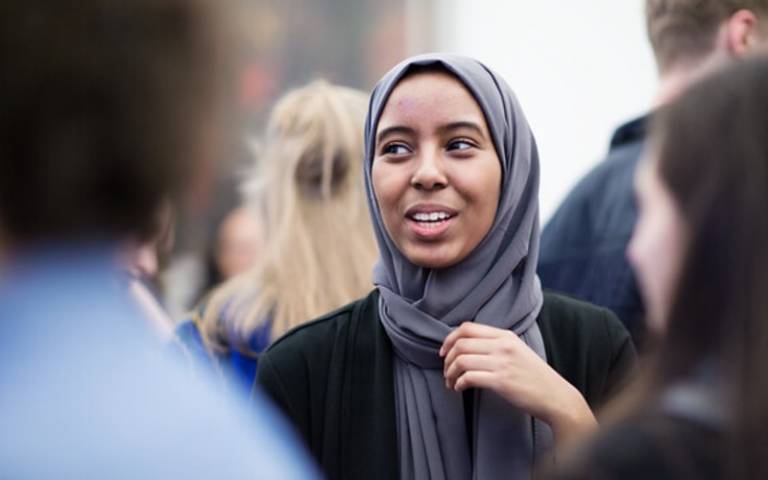Laidlaw Research and Leadership Programme 2022: scholars chosen
7 April 2022
After a competitive application process, 24 first-year undergraduates will take part in the 2022 Laidlaw Research and Scholarship Programme.

Laidlaw Scholarships are awarded to undergraduate first year students through a competitive process where applicants submit a proposal to undertake their own research project, or request to work on an existing project with researchers from UCL departments.
This year, a total of 270 first-year undergraduates competed for 24 places on UCL's branch of the prestigious programme, which runs at a number of overseas and UK universities including St. Andrew's and Durham.
Our scholars have real-world impact
The Laidlaw Programme is a brilliant opportunity for students to get involved in world leading research at an early stage of their academic career, and learn the skills that will make them into future leaders.
Past scholars have demonstrated the impact UCL undergraduate students can have on key research areas. An article from a 2020 Laidlaw Scholar, Nusayba Ali, on how pharmacists and pharmacy teams can address vaccine hesistancy, was published by the Pharmaceutical Journal at the height of the pandemic.
UCL departments that offer opportunities for Laidlaw Scholars to join their research projects also benefit, because they get a fully funded and enthusiastic junior researcher, who is driven to make a positive contribution.
“A UCL education offers students the opportunity to carry out their own research, and the Laidlaw Research and Leadership Programme is a great example of this, enabling first year undergraduate students to contribute to our world-leading research output across all the disciplines. The programme, now in its third year has been extremely successful, providing a challenging, rewarding experience for the scholars and excellent contributions to projects for research supervisors. Dr Ruth Siddall, Academic Director of the Laidlaw Programme.
Competitive application process
Once again this year there was a large number of high quality applications so the judging panel had a difficult challenge.
The panel, chaired by the Academic Director of the Programme, Dr Zachary Walker, considered each applicant's form alongside feedback from their project supervisors and an academic reference.
The final group of 17 women and 7 men study a varied range of subjects including Psychology, History, Natural Sciences, Medicine, Bioscences and Economics.
The 2022 scholars
See below for the full list of this year's Laidlaw Scholars and their research projects.
Name | Department | Project |
| Hannah Watton | English Language and Literature | Scholarly edition of letter exchanges |
| Grace Feng | School of Slavonic and East European Studies | What works and doesn't work in online economics education? |
| Riza Kamish Mirza | School of Slavonic and East European Studies | The Politics of Religion |
| Maia Dastur | Philosophy | Business and water: Walking the talk? |
| Anna Kung | Philosophy | Proxy Wars: Repeated Bargaining of Principals in Principal-Agent Relationships |
| George Roberts | Arts and Sciences BASc | Laidlaw Scholars Celebration Brochure |
| Chor Ting Rachel Wan | Medical Physics and Biomedical Engineering | Development of a novel optical ultrasound |
| Ramit Bag | Computer Science | Designing an Immersive VR Avatar Animation Software |
| Princess Emeanuwa | Education, Practice and Society | Longitudinal case study analyses of young people following STEM trajectories |
| Hiu Ching Chang | Law | A comparison of duress in contract and unjust enrichment law |
| Natalie Magness | Division of Biosciences | Is there a relationship between perception of genetic relatedness and altruism in humans? |
| Anatolii Zagorodnii | Natural Sciences | Self-assembly and ion transport by stimuli-responsive ruthenium(II) complexes |
| Keyi Xiong | Mathematics | Where do our discarded diesel vehicles go? |
| Aleksandra Czyzak | Division of Medicine | Understanding the fitness landscape of aging tissue |
| Elisyazaviera Muhamad Faizul | Cancer Institute | Actionable alterations in cholangiocarcinoma |
| Emma Last | Cancer Institute | Self-generated sounds in human neonates |
| Evdokia Crooijmans | Division of Surgery and Interventional Science | Multiscale modelling of blood flow |
| Julia Spaczynska | UCL Medical School | Mitochondrial function in health and disease |
| Laetisha Witoyo | UCL Medical School | Author name memorability and citations |
| Yi Xi Kang | Geography | Effectiveness of biological pest control in Icelandic greenhouses |
| Keir Chauhan | History | The effects of neoliberalism and globalisation in shaping the strategies adopted by the conservation movement (with specific reference to the Royal Society for the Protection of Birds, RSPB) |
| Marco Pozzi | History | Written and Visual Heritage of Medieval Africa |
| Nola Mak | History | Medieval Magic in 50 Objects |
| Jani Santarius | History | Rural radicalism and its suppression in the First Czechoslovak Republic, 1918-1938 |
What happens next?
The scholars will immediately get stuck into eight days of leadership training activities during the 2022 summer holidays and undertake a bespoke research project under the guidance of UCL academics over a six-week period. A generous bursary is paid to cover their living expenses whilst undertaking the projects.
Congratulations to this year’s scholars!
 Close
Close

